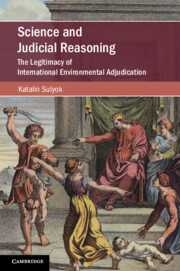Book contents
- Science and Judicial Reasoning
- Cambridge Studies On Environment, Energy And Natural Resources Governance
- Science and Judicial Reasoning
- Copyright page
- Dedication
- Contents
- Tables
- Foreword
- Acknowledgements
- Author Note
- Table of Cases
- Abbreviations
- Part I The Three-Fold Challenge of Engaging with Science in International Environmental Adjudication
- 1 Introduction to a Comparative Study on Judicial Engagement with Science
- 2 The Rules of Judicial Engagement with Science: A Three-Fold Challenge
- Part II Techniques for Judicial Engagement with Science in the Practice of International Courts and Tribunals
- Part III Engaging with Scientific Knowledge in the Judicial Reasoning
- Bibliography
- Index
2 - The Rules of Judicial Engagement with Science: A Three-Fold Challenge
from Part I - The Three-Fold Challenge of Engaging with Science in International Environmental Adjudication
Published online by Cambridge University Press: 15 October 2020
- Science and Judicial Reasoning
- Cambridge Studies On Environment, Energy And Natural Resources Governance
- Science and Judicial Reasoning
- Copyright page
- Dedication
- Contents
- Tables
- Foreword
- Acknowledgements
- Author Note
- Table of Cases
- Abbreviations
- Part I The Three-Fold Challenge of Engaging with Science in International Environmental Adjudication
- 1 Introduction to a Comparative Study on Judicial Engagement with Science
- 2 The Rules of Judicial Engagement with Science: A Three-Fold Challenge
- Part II Techniques for Judicial Engagement with Science in the Practice of International Courts and Tribunals
- Part III Engaging with Scientific Knowledge in the Judicial Reasoning
- Bibliography
- Index
Summary
This chapter maps the reasons why scientific arguments do not lend themselves to straightforward judicial appraisal. The study identifies epistemic, doctrinal, and legitimacy challenges, which generate difficulties in using science in an adjudicatory setting. Epistemic challenges stem from the fact that science and law are both capable of lending cognitive authority to knowledge claims, and these authorities may be in conflict with each other. Doctrinal challenges emerge from the fundamental differences in the ways in which law and science conceive basic concepts and their different levels of tolerance towards probabilistic evidence and uncertainty. Legitimacy challenges entail difficulties for judges to preserve their monopoly over the resolution of disputes and to select the appropriate rationality to justify their reasoning. This chapter also introduces the analytic framework of the book, which is designed to evaluate the varied judicial reactions given to the intrusion of science into the adjudicatory process. It therefore introduces and discusses the framing of disputes, the scientific fact-finding process, the causal inquiry, and the standard of review.
Keywords
- Type
- Chapter
- Information
- Science and Judicial ReasoningThe Legitimacy of International Environmental Adjudication, pp. 19 - 66Publisher: Cambridge University PressPrint publication year: 2020



